It is well known that India is a nearly $3 trillion economy (GDP) with a stock market that is almost nearly as big at $2.8 trillion. At a stock cap level, there are 100 large-cap stocks, 150 mid-caps, 666 small-caps and over 4,100 micro-caps. Such a representation may give an impression of many themes equally playing out at the same time. Rockstud Capital believes that or FACTh theme accounts for nearly 2/3rd of Indian stock market is the theme to be played for wealth creation.

In a webinar organised by PMS Bazaar, Abhishek Agarwal, Managing Partner, Rockstud Capital talks about this massive theme that is so simple and right in front of most investors' eyes & how can one significantly reduce the risk of investing in Early Stage Startups.
Rockstud Capital Investment Fund – Series I, is a SEBI regulated Category II Alternative Investment Fund (AIF) which follows a Unique Hybrid Equity Strategy investing in Early-Stage Startups at Pre-series A round & Listed Equities traded on NSE in a split of 51:49 to mitigate risk and liquidity issues. In this article, we look at the key points of the webinar.
India is where China was in 2005's
Speaking of the domestic macro situation, Abhishek belives that Indian GDP is poised to touch $10 trillion by 2030. Therefore a 3x jump in 10 years.
Comparing India's economy with that of China, he said we are at an inflection point where China was in 2005. The Chinese per capita GDP grew 5-fold from the base of $2000 in 2005 in the subsequent 15 years.
With the financial inclusion theme being played out, Abhishek expects the shift in savings to financial assets to continue. Between FY19 to FY24, wealth is expected to grow very fast.
Even amid the second corona wave, stock markets have not capitulated. Abhishek reasoned that Bloomberg estimates shows resilience in the index performance being backed by a fundamental push in earnings growth.
FACT(H)s of the case
Coming to the massive theme playing out in listed equities, Abhishek revealed that the FACT(H) theme is the one to note. FACT(H) accounts for 54 per cent of India’s market cap or 46 per cent of India’s GDP.
FACT(H) is an acronym which stands for Financial, Agriculture, Consumption, Technology & Healthcare. Under this massive theme, there is a universe of 740 stocks to choose from. The fund focusses on mid-cap, small-cap stocks on NSE based on market cap, thereby reducing its universe to ~450 stocks.
F – Financials: The journey from developing countries to developed countries is not possible without the support of a strong Banking & Financial Sector. India being one of the fastest growing economies in the world, with the significantly low credit to GDP Ratio (51% vs 150-200% for developed economies), Low penetration in Individual life policies (25%), Mortgage (10%), No of Motor Insurance (7%), MF Folio (6%), Demat Ac’s (3%), SIP (2%) etc provides a huge runway for the growth of the Financial Sector. Stocks in this sector includes Banks, NBFC, Housing Finance, Broking & Wealth Management, AMC, Insurance and Exchanges.
A – Agriculture: The old-economy bellwether, Agriculture is the largest source of livelihood for majority of population (58%) and yet it accounts for only 15% of the GDP. Agriculture is therefore expected to throw up opportunities as correction happens on the back of low to high farm mechanization, increased government thrust and doubling of farmer’s income. The stocks in this segment includes Fertilizers, Agro Chemicals, Sugar, Tea & Coffee, Aquaculture, Animal Husbandry, & Dairy.
C – Consumption: India is a domestic consumption-driven economy (57% of GDP) and its booming consumption is the backbone of India's growth story. Structural factors like nuclearisation of families, rising aspirational middle class, easy financing, increased GDP/Capita in an underpenetrated (Refrigerator – 35%, Washing Machine – 15% & AC – 12%) and highly unorganized market provides gigantic opportunities. The stocks in this segment includes consumer electronics, personal products, hotels, footwear, furniture, furnishing & paints, textile, air conditioners, departmental store, consumer foods etc.
T – Technology: IT industry has become the light house for India’s growth. It is one of the most resilient and consistent industry. India today has become the digital hub of the world and accounts for ~75% of global digital talent and accounts for 45% of services export. It has grown from 1% of the GDP in 1998 to over 8% in 2020 to reach $190 bn and is estimated to reach $350 bn by 2025. The stocks in this segment includes IT consulting & software, IT services, Internet software & services, and BPO/KPO.
H – Healthcare: India’s domestic pharma market turnover has reached over $20 billion. India has one of the highest number of FDA compliant plants outside USA, this itself speaks volume about our medical infrastructure. Low-Cost Production (30 to 40% lower than most other foreign destinations), Government’s initiatives like setting up of Mega Parks ($940 Million), dedicated und of $1.3 Bn for API Manufacturing, will further lead to the growth of the industry. The stocks in this segment includes Pharmaceuticals, Hospitals, Medical Equipment's.
Abhishek explained that Rockstud Capital Investment Fund allocates not more than 40 per cent in a single sector. The fund has a mandate to invest in max. 15 stocks spread across its FACT(H) Theme.
Startup Investment Thesis
Besides listed equities, Rockstud Capital Investment Fund invests in Start-ups. Given the high-risk and high-return nature of start-up investing, there is a lot of focus which is put on stage for participation, sector selection, and selecting the right company by Abhishek and his team.
The Fund targets Pre-Series A stage companies and prefers to invest in start-ups with atleast 2 years of operations, minimum ?2 crore of net revenue in the last 12 months and a positive gross margin. The fund focusses on start-ups hailing from Consumer Products, Mobility, HealthTech, Enterprise Applications, AgriTech & FinTech space.
Abhishek said the fund invests along with other institutional investors, thus backing in validated ideas. Further the round size is expected to be more than million dollar for Rockstud Capital to participate.
Talking on deal sourcing, Abhishek said the fund has evaluated more than 400 deals. "Less than 50 per cent qualify as per investment criteria and less than 5 per cent of qualified deals are actual investible ideas," says Abhishek who has 12+ years of experience in Indian financial markets.
Rockstud Capital Investment Fund follows an elaborate screening process with multiple due diligence processes involved. The fund maintains the balance in participating in both B2B and B2C tech enabled companies having elements of ESG (Environmental, Social and Governance).
Talking about start-up investee companies, the Rockstud Capital invested in Everest Fleet, Cubical, Smart Vizx, Big Haat, Lilac Insights and Instorid.
On entry and exit strategy, Rockstud Capital Investment Fund clarified that it does not invest in startups which are at seed and angel stage which is called the 'valley of death stage' where the failure rate is significantly higher, but instead provides the bridge capital for the growth of the startup. Pre-series A stage or bridge funding not only allows the Fund to reduce the risk but also enables the fund to have faster exits. Unlike a typical Venture Capital Fund which generally has a tenure of 7-10 years plus applicable extensions, Rockstud Capital Investment Fund has a short tenure of 4 years plus applicable extensions. The exit point targeted by the AIF in the case of start-ups is at Series B. Exit options are strategic sale to corporates, follow-on round of funding, drag along right, etc.
"The fund has built strong relationships with multiple stakeholders in the startup ecosystem. This not only helps from deal sourcing perspective but also helps in exploring exit opportunities in investee companies,' said Abhishek.
For more information, please contact info@pmsbazaar.com
Recent Blogs

January Rout, Extreme Dispersion: PMS Returns Swing From Losses to Gains
Benchmark falls deepened losses, but multi-asset and debt cushioned portfolios meaningfully
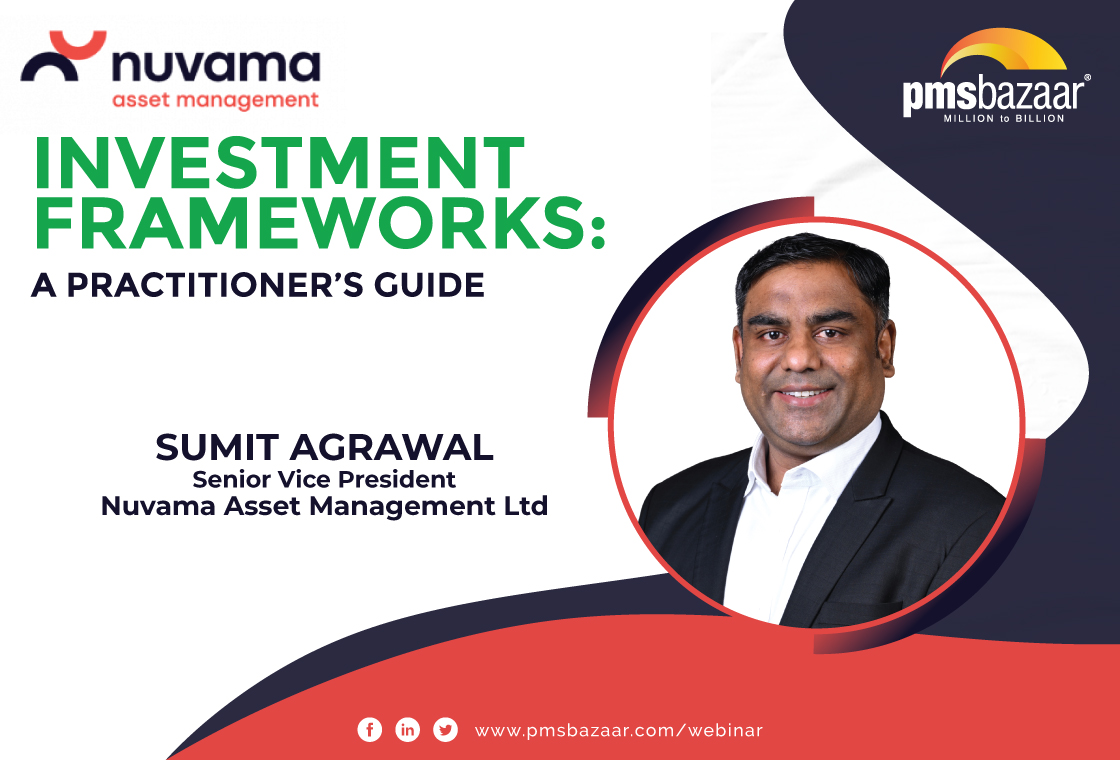
Investment Frameworks : A Practitioner’s Guide
PMS Bazaar recently organized a webinar titled “Investment Frameworks: A Practitioner’s Guide,” which featured Mr. Sumit Agrawal, Senior Vice President, Nuvama Asset Management Limited. This blog covers the important points shared in this insightful webinar.
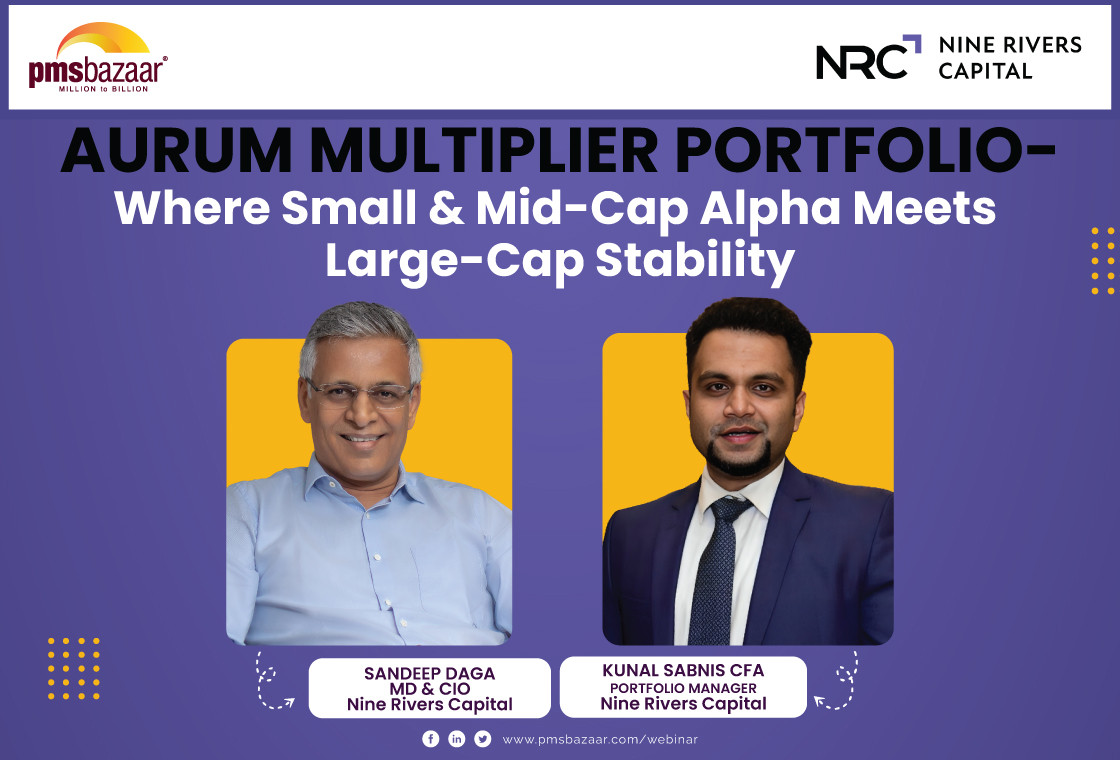
Aurum Multiplier Portfolio - Where Small and Mid-Cap Alpha Meets Large-Cap Stability
PMS Bazaar recently organized a webinar titled “Aurum Multiplier Portfolio - Where Small and Mid-Cap Alpha Meets Large-Cap Stability,” which featured Mr. Sandeep Daga, MD& CIO, Nine Rivers Capital and Mr. Kunal Sabnis, Portfolio Manager, Nine Rivers Capital. This blog covers the important points shared in this insightful webinar.
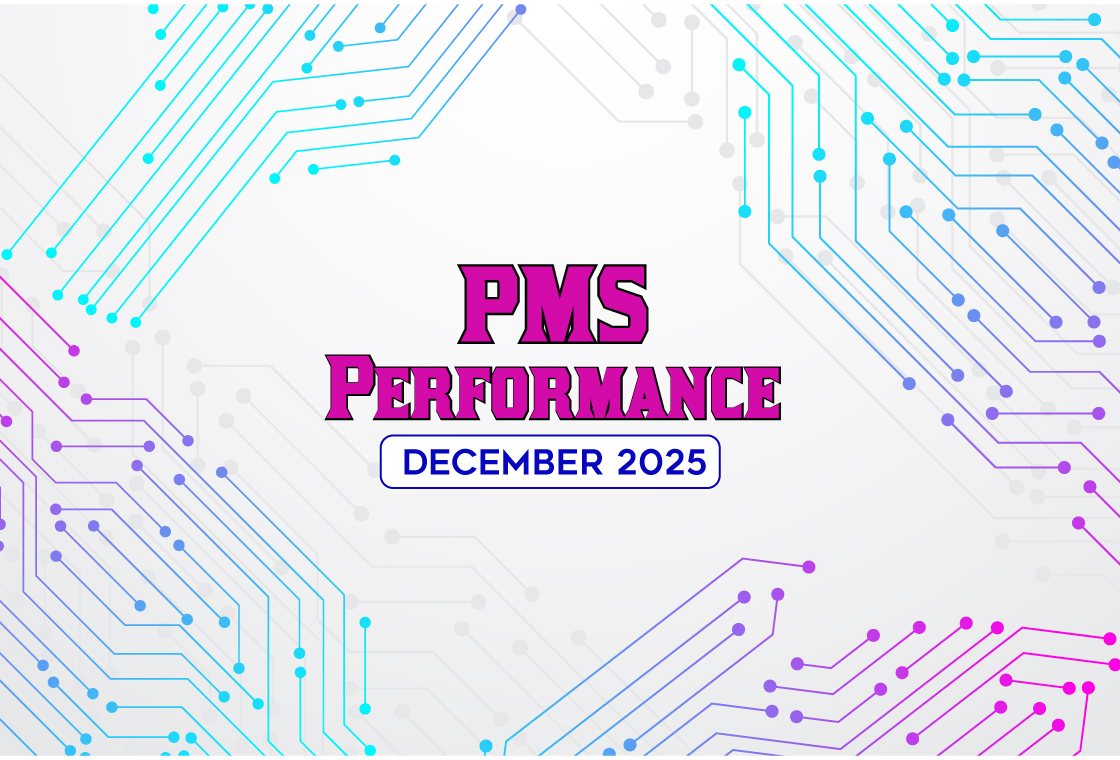
Flat Markets, Wide Outcomes: How 484 PMS Strategies Performed in Dec 2025
December 2025 was a month where market returns stayed close to flat, with the Nifty 50 TRI at -0.28% and the BSE 500 TRI at -0.24%.
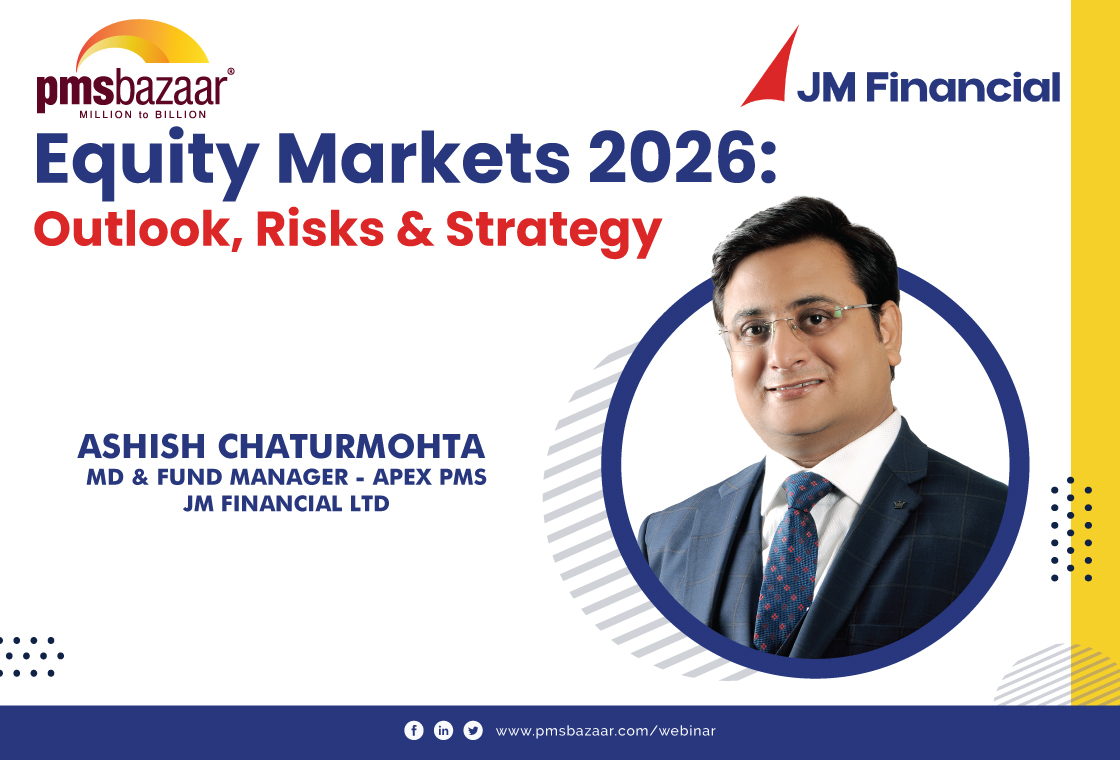
Equity Markets 2026: Outlook, Risks and Strategy
PMS Bazaar recently organized a webinar titled “Equity Markets 2026: Outlook, Risks and Strategy,” which featured Mr. Ashish Chaturmohta, MD & Fund Manager – APEX PMS, JM Financial Limited. This blog covers the important points shared in this insightful webinar.

MICRO CAPS: The Dark Horses of the Indian Equity Market
PMS Bazaar recently organized a webinar titled “MICRO CAPS: The Dark Horses of the Indian Equity Market,” which featured Mr. Rishi Agarwal and Mr. Adheesh Kabra, both Co-Founders and Fund Managers, Aarth AIF. This blog covers the important points shared in this insightful webinar.
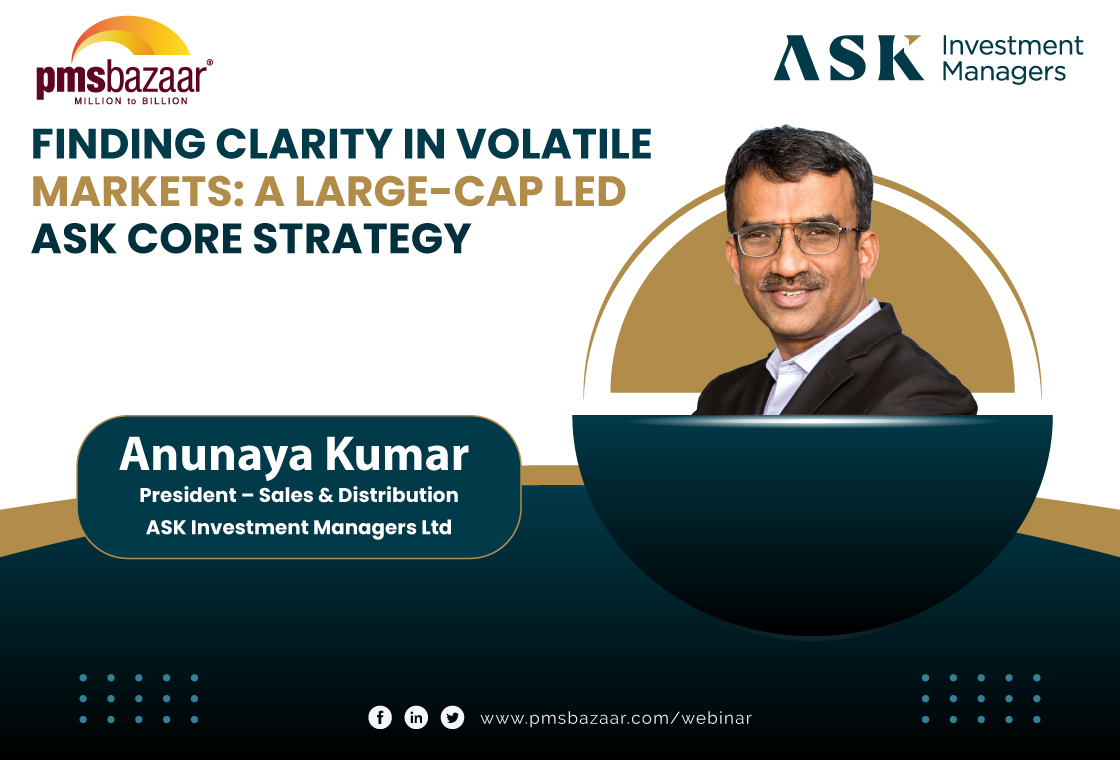
Finding Clarity in Volatile Markets: A Large-Cap Led ASK CORE Strategy
PMS Bazaar recently organized a webinar titled “Finding Clarity in Volatile Markets: A Large-Cap Led ASK CORE Strategy,” which featured Mr.Anunaya Kumar, President – Sales and Distribution ASK Investment Managers Limited. This blog covers the important points shared in this insightful webinar.
.jpg)
Passively Active Investing — A Modern Investor’s Lens on ETF-Based PMS
PMS Bazaar recently organized a webinar titled “Passively Active Investing — A Modern Investor’s Lens on ETF-Based PMS,” which featured Mr. Karan Bhatia, Co-Founder and Co-Fund Manager , Pricebridge Honeycomb ETF PMs. This blog covers the important points shared in this insightful webinar.

